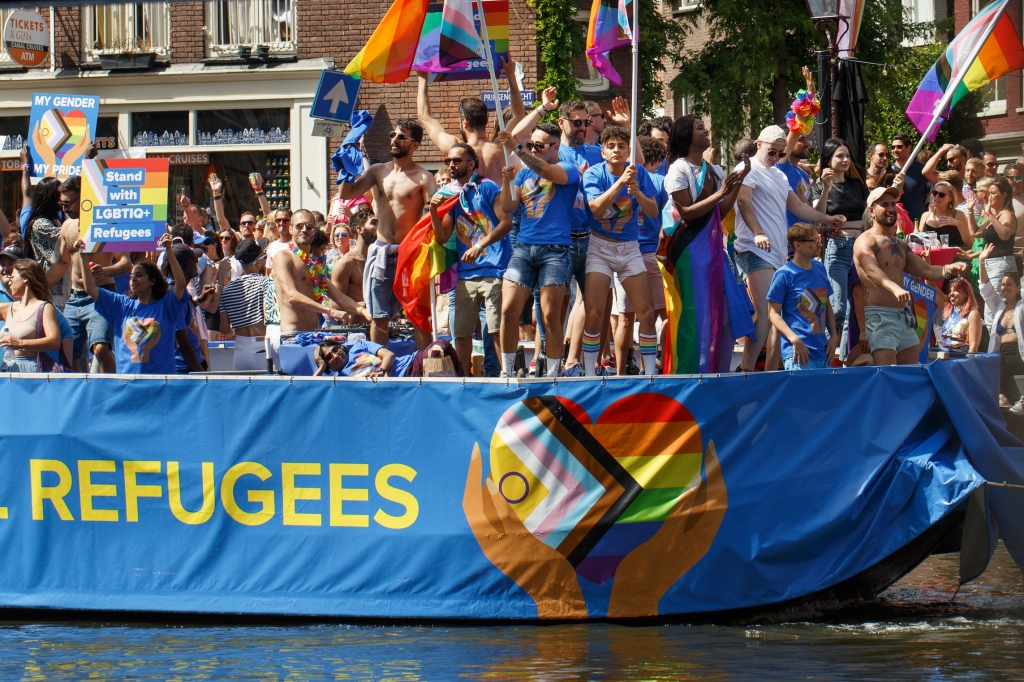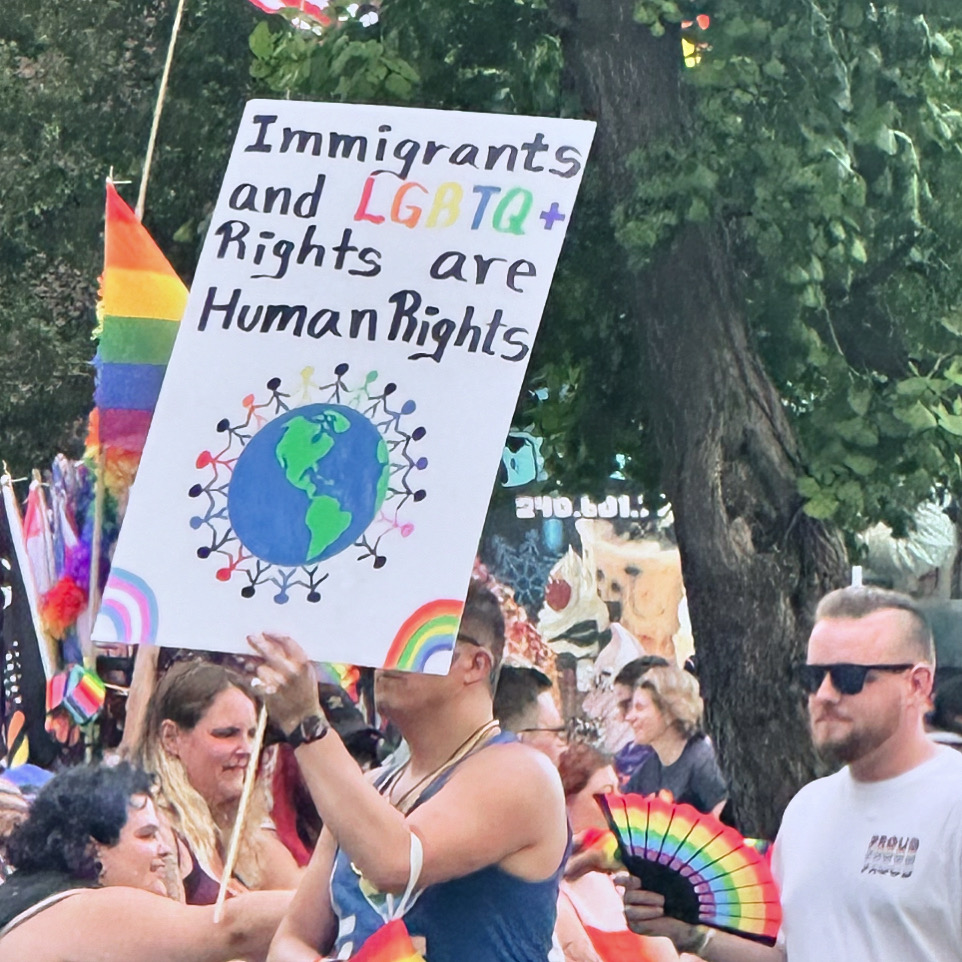“For a World Where Refugees Are Welcomed” is the aspirational theme for this year’s World Refugee Day. Every June 20th, we are reminded of the resilience and courage of those forced to flee their homes, whether due to war and strife, climate catastrophes, poverty and hunger, or persecution.
Each World Refugee Day, we renew our solidarity to ensure that refugees not only survive but thrive, in safety and in dignity. We do so in a world where there are now more than 117 million forcibly displaced persons — a jump of nine million persons in just one year — according to the UNHCR, the U.N. Refugee Agency.
This work is especially urgent for LGBTQI+ refugees escaping abusive families, government discrimination, and violence from a broad range of non-state actors. Consensual same-sex relations remain criminalized in roughly 65 countries. Even after fleeing their families and communities of origin, LGBTQI+ refugees and asylum seekers face dramatically higher rates of violence, sexual assault, extortion, and other mistreatment from law enforcement and border security forces, from organized crime syndicates, and even from other refugees.
CGE members and partners have long documented these dangers, from LGBTQI+ shelters along the U.S.-Mexico border to the sprawling refugee camps in Kenya. Nor do these dangers end upon reaching the United States: a new report this week from Immigration Equality, Human Rights First, and the National Immigrant Justice Center (NIJC) revealed the systemic abuse of LGBTQI+ and HIV+ individuals detained in ICE and CBP facilities. Such abuses include physical and verbal attacks, sexual assault and sexual harassment, denial of health care, solitary confinement, and inadequate access to legal representation.
On this World Refugee Day, the situation for LGBTQI+ refugees seeking safety and asylum in the United States is growing increasingly perilous.
First, some good news. To its credit, the Biden Administration has made critical improvements in rebuilding the overall refugee resettlement infrastructure gutted by the Trump Administration — and that Trump and his allies promise to completely eviscerate should they return to power. These improvements include restaffing refugee programs and restoring resources devastated by his predecessor. With just over 55,000 refugees admitted to the United States in the first seven months of FY24, there is a plausible chance of meeting the Biden Administration’s target goal of 125,000 admissions for the year. (For perspective, the four-year total under the previous administration was roughly 64,000.)
And just this week, President Biden announced a legal pathway to citizenship for 500,000 undocumented spouses of U.S. citizens, one of the most dramatic acts to protect immigrants since the since the enactment of Deferred Action for Childhood Arrivals (DACA) during the Obama Administration.
Perhaps the pride of the Administration’s efforts to rebuild refugee system is its Welcome Corps program, which seeks to harness the power of community sponsorship to support refugee resettlement. Small groups sponsor an individual refugee, helping new arrivals find housing and employment, enroll in English classes, access benefit programs, and begin building their new communities in the United States. In its first year, sponsors welcomed nearly 100 refugees — modest numbers to start, to be sure, but those numbers obscure the massive effort by our colleagues at State, by officially recognized Private Sponsors Organizations such as Rainbow Railroad, and by hundreds of volunteers to build and test new resettlement systems and ensure that the first refugees all thrived upon arriving in the United States.
Rainbow Railroad, building on its pioneering private sponsorship partnership with the Canadian government, has been organizing Welcome Corps sponsorship groups to resettle LGBTQI+ refugees in Washington, D.C., Chicago, and other U.S. communities. The Washington Blade covered the resettlement of “Xander,” a queer man from El Salvador who arrived in D.C. in November 2023. He left his home country fearing for his life after enduring ongoing verbal abuse and discrimination after a neighbor beat his mother and grandmother, and knowing that no law or police officers would protect him.
Xander has thrived since coming to Washington — as have several gay refugees from Venezuela who arrived this spring via sponsorship from local Rainbow Railroad groups, including one organized by CGE’s Ian Lekus. In that case, the newcomer found employment almost immediately, followed a few weeks later by a terrific housing opportunity, and earlier, this month, he got to celebrate his first massive Pride event.
However, through our work to support Welcome Corps, Rainbow Railroad and other CGE members advocating for refugee resettlement have discovered a major policy gap: the U.S. government does not track which refugees are LGBTQI+-identified. This poses a tremendous challenge to connecting queer refugees with either Welcome Corps or other resettlement pathways. Our members continue to call for fundamental changes to the U.S. Refugee Admissions Program (USRAP) to ensure that self-declared queer refugees are identified in the admissions system, tracked, and receive LGBTQI+-sensitive resettlement and support services, including full protection of their confidentiality.
So, nearly four years of work to rebuild the refugee system are starting to pay off, and even longer campaigns to make U.S. refugee resettlement mechanics more responsive to the urgent needs of LGBTQI+ people are just beginning to bear fruit. That’s the good news this World Refugee Day.
The bad news comes starting with President Biden’s Executive Order earlier this month that effectively shuts down the U.S.-Mexico border and dramatically limits the right to claim asylum at the southern border — thus breaking with the longstanding guarantee of that right to anyone who steps onto U.S. soil. The Executive Order effectively reinstitutes Trump’s asylum ban while conceding to the Republican demands in the border security bill from earlier this year that far-right extremists in the House blocked from passage in order to help the Trump campaign.
Amnesty International USA, Human Rights First, Immigration Equality, IRAP (the International Refugee Assistance Project), and Rainbow Railroad — all CGE member organizations — have all forcefully condemned Biden’s June 4th Executive Order.
Steve Roth from ORAM (Organization for Refuge, Asylum, and Migration) explained that the Executive Order will harm “LGBTIQ asylum seekers and other vulnerable individuals seeking refuge from persecution.” It will also “put more LGBTIQ asylum seekers in harm’s way in dangerous Mexican border towns and puts added pressure on refugee-serving organizations throughout Mexico.” Christina Asencio of Human Rights First added how the Executive Order will “endanger LGBTQI+ people seeking asylumby requiring them to wait months in Mexico to obtain a CBP One appointment where they face acute risks of anti-LGBTQI+ persecution and suffer kidnappings, sexual assault, and other harms due to their sexual orientation, gender identity, race, language, and nationality.”
IRAP’s Hannah Flamm condemned the Executive Order as “disgraceful political theater,” and Immigration Equality’s Bridget Crawford concurred, noting, “President Biden is playing craven political games with the lives of refugees, including LGBTQ people fleeing persecution, instead of implementing workable solutions.”
Crawford continued, declaring, “For queer and trans asylum seekers, asylum is a critical lifeline. LGBTQ people are persecuted around the globe for being who they are. During Pride month the President should be proclaiming his commitment to protect LGBTQ refugees and upholding his promise to them, not enacting policies that will result in the preventable persecution, torture, and death of queer and trans asylum seekers.”
Indeed, seeking asylum is a human right. LGBTQI+ individuals seeking refuge in the United are fleeing criminalization, discrimination, and violence. This unlawful ban violates U.S. and international refugee laws, endangers LGBTQI+ people at risk seeking safety at the border, and breaches the 2021 Presidential Memorandum on Advancing the Human Rights of LGBTQI+ Persons Around the World. This will leave queer and trans refugees in danger without a viable means of finding refuge and vulnerable to being sent back to life-threatening circumstances.
Let’s be clear here: this Executive Order is catastrophic for LGBTQI+ asylum seekers and other asylum seekers from vulnerable populations — and it’s highly unlikely to help move the electoral needle. The EO is grounded in false narratives about border invasions and enacts exclusionary policies based on white supremacist thinking. It does so at a time when there are more forcibly displaced people in the world than at any other time in recorded history, when we need concrete, LGBTQI+-inclusive solutions that uphold human rights and create secure pathways to safety.
The Biden Administration must do better.
Of course, as we push the Biden Administration to reaffirm its commitment to refugee rights and abandon the politics of fear, we must also organize vigorously against the xenophobic, homophobic and transphobic, and comprehensively authoritarian plans of the Trump campaign and the far right. Project 2025 — the Heritage Foundation-led Presidential Transition Plan for the next conservative administration — represents an existential, Christian Nationalist, “post-Constitutional” threat to multiracial, pluralistic democracy. Project 2025 takes direct aim at both LGBTQI+ people — especially transgender people — and immigrants, as well as sexual and reproductive health and rights, racial equity, climate change mitigation, a professional civil service, and even the basic rule of law. The plan demonizes immigrants as a crime-ridden plague, promising the deportation of millions of undocumented immigrants, sprawling internment camps, and effectively eliminating asylum for those facing social persecution.
So, this World Refugee Day, we must reaffirm our commitment to building a world where all refugees are welcomed — regardless of sexual orientation, gender identity or expression, sex characteristics, or any other status subjecting them to violence and persecution. And we must redouble our defense of democracy to ensure the safety, security, and dignity of all who are vulnerable.



